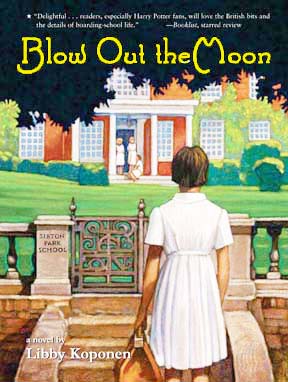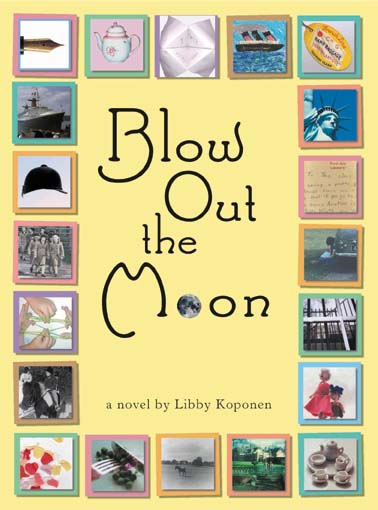|
A reader named Haley wrote
and asked if she could interview me for a school project. Here are her
questions, my answers, and the email she wrote after it was all done.
I include that because I had thought about her questions a lot
and I was glad she had noticed that and appreciated it! I was also impressed
that she wrote such a nice thank you note.
1.
What made you decide to be an author?
I've wanted to be a writer ever since I can remember -- probably, because
I loved books (and talking!) so much....but I've wanted to be one since
before my memories even start. See answer to next question.
2.
What type of education or training is required for
writing? What type have you had?
Writing is something you learn by loving words, reading, listening to
people talk, being curious, being interested in other people, writing
and rewriting and rewriting, more times than you can imagine.
I started writing stories when I was seven and I've been writing ever
since.
I was lucky
enough to have been given a very good education, in England (well, you
know about the Sibton Park part of my education from BLOW OUT THE MOON)
- and at my boarding school in America, Kent. I also went to graduate
school in writing, but I now think that was a complete waste of time
and money - I would have been better off going to live in another country
for awhile or just using the money I saved for graduate school to live
on later, when I had become a better writer and could have used the
time!
What's more important (I think) than a formal education for a writer
is loving books and loving words. The author of Mary Poppins, PL Travers,
wrote a really interesting essay about how overhearing adult conversations
and trying to figure out what they mean is stimulating to children's
imaginations. (The essay is called "On the Sleeping Beauty."
It's really good!)
Reading is of course good too. I've also always,always loved books.
A friend of my father's told me that the first time he met me - I was
probably about two - I was carrying a book. My father said,
"It's her favorite toy, she takes it with her everywhere. Do you
think that's significant?"
I wasn't an early reader, but even before I could read myself (I used
to memorize books and then say the words outloud, pretending I was reading:
I knew where to turn the pages, too). Once I did start reading to myself,
I loved to do it and read (and wrote stories) constantly. THAT, more
than any formal schooling, was probably my training.
This sounds conceited and I hope it isn't, but I think writing does
also involve some innate quality that really can't be learned: some
people might call it creativity or talent, I call it "having something
to say." Not everyone does. (See #11.)
3.
What do you like most about being an author? What
do you like least?
I like writing itself, getting emails from kids -- in fact, I LOVE getting
letters from children who have read my book, and going to schools for
visits. These are probably my favorite parts: they make all the unfun
parts seem worthwhile. Also I have to admit that since it's something
I've wanted all my life, I still get a huge thrill whenever anyone calls
me an author!
I hate marketing: trying to sell my book. "Marketing" means
all the things that authors do to get people to buy their books - some
authors spend most of their time doing these things (I don't). I should
spend more time doing the marketing.
4. What other people do you work most closely
with?
I don't really work closely with anyone: this is one thing about being
a writer that some people don't like. I love it! When I write, I do
it by myself, at home. Later I work with editors (I talk about that
a lot in the Education Oasis interview so I won't repeat it all here).
5. What are some careers that are related to writing?
Writing books isn't a career, with steps and training and degrees, or
a job you apply for. You just do it because you love it. You try for
a long time and if you're good at it and work hard, you get better;
and then if you're lucky, people want what you write.
6.
Please describe the publishing process.
I'm not sure what you mean - how do you get published? There is no one
answer to that question. It's really, really hard, since most publishers
now don't even consider manuscripts that are just sent to them by unknown
people. These are put on what is called "the slush pile" -
one editor told me once that just for fun, she once asked her assistant
to count how many unsolicited manuscripts they received every week:
it was several hundred. In the twenty years that editor was at that
company, they published 12 of these. So, the odds are against getting
published.
BLOW OUT
THE MOON got published (I think) because I put the whole book on the
Web and a lot of kids wrote to me about it. When I wrote to publishers
asking if they would like to see the book, I sent copies of those letters.
I was also lucky that an editor READ my letter (lots of times, no one
does!) and thought my book sounded interesting. She asked me to send
it to her and I did.
8.
What exactly is a royalty? How much is the average
one?
A royalty is the percentage of the book's price that goes to the author.
There isn't any such thing as an average…..on some books, I get
10% of the list price (the price people pay in stores). On some I get
5%. On some I don't get anything.
Sometimes, royalties are on a sliding scale - they go up after a certain
number of copies have been sold.
Often, when a publisher agrees to publish a book, they give the author
what is called an "advance against royalties," or "advance."
If, for example, the advance is $5000, the first $5,000 of the author's
royalties go to the publisher; the author only gets royalty checks after
the advance has been paid back.
Most novels never earn back the advance - the publisher loses money
on the book and the author never gets any money beyond the initial advance.
9.
What activities take up most of your time on the
job? & 7. What is your workplace like (if you have one)?
This isn't a job! It's what I love to do. I write at home, whenever
I can….. I probably spend a lot of time waiting, because I've learned
that I can't write until I know what I want to say. When I was younger
I used to just write, as though just typing would produce ideas. Now
I wait for them to hatch - it's hard to explain. I think every writer
develops her own process over time. Mine is to write down my ideas when
I wake up, then do other things for a few hours and sort of let them
simmer, then sit down to work. I work at a desk, looking out at a field
and five bare oak trees. (When I lived in Boston I used to look out
at a school and a playground and all day I saw kids walking between
the two places: what a great place to write THAT was!)
I have lots of pictures I like around me, and pictures kids have drawn
for me, and a pebble from Jane Austen's driveway under my desk (on the
sliding thing that's supposed to hold the keyboard).
10.
Does any author inspire you? Why?
Jane Austen
E. Nesbit
--because they write so well and their characters are so real and believable.
They both make me laugh, too.
11.
Do you have any advice for young, aspiring
authors?
YES! (and if you only put one thing from this interview, please put
this answer!) Stay curious and interested in lots of things: then you'll
always have something interesting to say. Read everything - especially,
good books. Think about what makes them good, learn to tell the difference
between what you like and what is good. Look words up in the dictionary
a lot. Care passionately about grammar and words - how they sound, what
they mean. Have something to say - if you have nothing to say, what's
the point of writing? Be patient, both in waiting to have something
to say and in working hard to say it was well as you can -- write and
then rewrite and rewrite and don't stop until what you've expressed
your ideas as well and as clearly as you can.
Don't expect to make much (or any, at first!) money from your writing
- and do plan to support yourself in some other way, ideally, one that
gives you the time and energy to write.
Develop self-discipline.
Good luck! (and to get published, you will need good luck in addition
to hard work and talent and something to say).
12.
Do you have any suggestions for other ideas or
sources of information about authors?
Read writers' autobiographies - especially autobiographies written by
writers you really like .
I added a page to my Web site that has interviews and Q&As that
may be helpful (if it's not too late!):
www.ifyoulovetoread.com/press.htm
The ones that you will probably find the most interesting are in the
Q&A from a kids' reading group and the interview with Education
Oasis.
<the rest of my email I leave out because it's personal to her>
Your friend,
Libby
Dear
Ms. Koponen,
Thank
you for your answers. They were absolutely
creative and thorough! They have helped me a whole
lot! I learned so many new things about one of my
favorite authors!
Thank
you for your time.
I
can't wait to read your next book!
Haley
|

The
paperback will be in bookstores starting in May.
Go
to online sample chapters 
|

